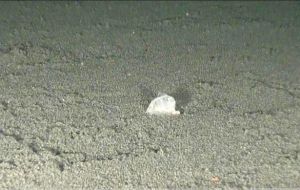MercoPress. South Atlantic News Agency
Baltic Sea patched with ‘dead zones’ reveals research expedition
 Microscopic algae threatens to suffocate marine life by sucking oxygen (Photo Oceana)
Microscopic algae threatens to suffocate marine life by sucking oxygen (Photo Oceana) A research expedition in the Baltic Sea has yielded spectacular photos of surprisingly colourful life below the calm surface. But the images also reveal a more sinister reality -- the alarming spread of “dead zones” threatening aquatic life.
Photos of bizarre underwater creatures often come from exciting tropical regions, but the recent expedition by international marine conservation group Oceana shows that even the brackish Baltic Sea is home to some stunning wildlife.
Oceana organized the campaign in the northern European waters to analyze the health of the sea's ecological systems. The hope is that data collected during the two-month mission will help establish new marine protection zones and encourage stricter enforcement in areas already under protection.
Scientists, conservationists and professional divers are among those participating in the project onboard the ‘Hanse Explorer’, a 48-meter expedition vessel using remotely operated vehicles (ROVs), underwater photography and video to document the team's findings.
“Some of the photos are shocking,” said Oceana project leader Anne Schröers on Wednesday. “A number of the areas we photographed have been destroyed by powerful trawling nets.”
Oceana's research between the coasts of Denmark and Sweden has also uncovered damage done by pollution, over-fishing and microscopic algae, which threatens to smother the Baltic Sea and its inhabitants. The algae, called phytoplankton, literally suffocate marine life by sucking up oxygen in the water.
Although phytoplankton is a natural phenomenon, clouds of the microscopic monsters have multiplied at an alarming rate due to pollution. Agricultural fertilizer runoff from shorelines and discharge from sewage treatment centres add chemicals like phosphorous and nitrogen to the ecosystem, accelerating what scientists call “blooms” of the dangerous algae.
Over fishing exacerbates the problem. It's a perfect example of the food chain in action: Baltic Sea cod eat sprats, a type of small fish, which eat microscopic zooplankton, which eat algae like phytoplankton. But over fishing of the cod can increase numbers of zooplankton and result in an explosion in the growth of pesky phytoplankton.
Too much algae contributes to the development of “dead zones,” parts of the sea where bacteria breaking down bits of dead algae have consumed most of the water's life-giving oxygen. Today, the Baltic Sea is home to seven of the ten largest dead zones in the world.
In the end the problem comes a full circle to affect humans too. The algal blooms can be toxic to swimmers and can even ruin a Baltic beach vacation -- at least for those who don't fancy sunbathing next to foul green scum.
Scientists have been aware of the Baltic Sea's problems for some time, but the Oceana photos of the remaining electric-blue jellyfish, flower-like anemones and spiny neon pink shrimp now show the astounding diversity of the sea life at stake.




Top Comments
Disclaimer & comment rules-

Read all commentsThis is probably the most juvenile-ly written article on the subject I have ever read (and I have read many!).
May 13th, 2011 - 10:28 pm 0As well as errors of fact there is a virtual absence of understanding of basic scientific principles at work in the ennvironment.
A lamentable misunderstanding of the word Diversity, of the basic principles of ecology, and of elementary natural history.
I imagine this Mercosur article is taken virtually verbatim from a European Sunday magazine article - if it were taken from eg New Scientist it would at least have the science right.
Commenting for this story is now closed.
If you have a Facebook account, become a fan and comment on our Facebook Page!